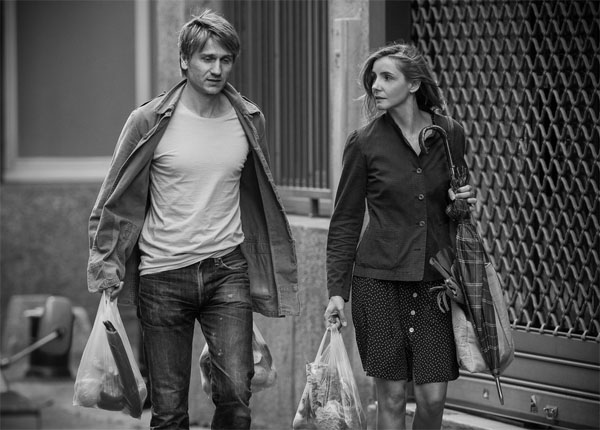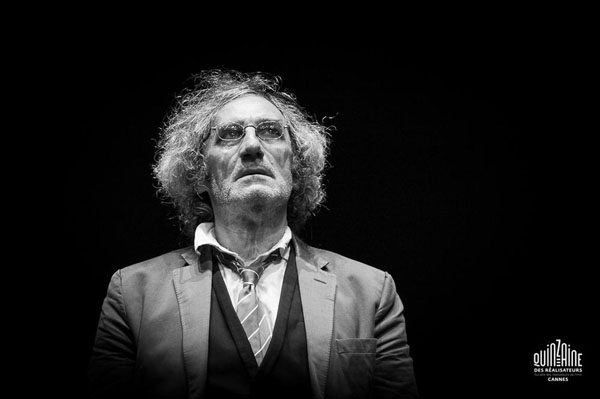We begin with Fabien Lemercier at Cineuropa: “A magnificently sculpted black and white film which plunges us into the twists and turns of life as a couple, a striking and deceptively simple film about truth, lies and blindness, an implicit portrait of life as a penniless artist: the best ingredients of the inimitable and timeless style of French filmmaker Philippe Garrel are brought together in In the Shadow of Women which today opens the 47th Director’s Fortnight of the 68th Cannes Film Festival. By placing Stanislas Merhar, Clotilde Courau and Lena Paugam in the leading roles, the French filmmaker happily brings back his favorite themes, creating a short film (1h13) that is clean-cut and bright as a solitary star following its unwavering trajectory through the ages, since Philippe Garrel was already featured in the 1st Directors’ Fortnight in 1969. A long career that he has made good use of to refine a fascinating mastery of aesthetics grafted onto a universal emotional vein tinged with a hint of the autobiographical.”
“Garrel began making movies in the late 1960s, as the Nouvelle Vague was giving way to yet another new generation of cinematic enfants terribles, and many of the nearly 30 features he’s made since then have addressed similar themes of personal and professional intimacies in the lives of bohemian characters not unlike Garrel himself,” writes Scott Foundas in Variety. “[W]hat gives In the Shadow of Women its particular frisson is the director’s concerted effort to cast light on the self-absorption of the male ego, and on the noble women who suffer its petty recriminations. The voiceover goes some way towards achieving this, as do the sharply drawn portraits of both Manon [Courau] and Elisabeth [Paugam], women with the independence of mind and body too rarely glimpsed in movies made by male directors.”
“Women may just well be fighting for their ‘shadow,’ the ‘dark’ zone where they are not only devoted wives or passionate lovers, not roles anymore, but may want everything, all at the same time,” writes Marie-Pierre Duhamel in the Notebook. “In this apologue where irony constantly and delicately colors the drama, space (rooms and streets) and time (past and present) are shaped and redesigned by the play of immobility and movement, words and silence, lies and truths, while Louis Garrel’s off-screen voice builds the stations of a man’s path towards… an ending which remains open to each viewer’s interpretation.”
“This is the first time Garrel has filmed a script co-written by veteran screenwriter and frequent Buñuel collaborator Jean-Claude Carrière,” notes Boyd van Hoeij in the Hollywood Reporter, “and the wicked irony typical of some of the Buñuel-Carrière projects can be felt here—and proves a welcome antidote to Garrel’s tendency to play things straight and low-key.”
“The moody, black-and-white cinematography [by Renato Berta], literary voice-over and intense exploration of messy relationships and broken hearts effortlessly evokes the world of Eric Rohmer and François Truffaut,” finds Allan Hunter in Screen. “Garrel subverts the nostalgic mood by turning the travails of a married couple into a lightly witty treatise on double-standards in relationships where men think they can act with impunity and women are merely expected to suffer in silence.”
Updates: For the Guardian‘s Benjamin Lee, “while the setup might evoke Baumbach and the following plot recall well-mined Woody Allen territory, Garrel struggles to unearth anything new. The mechanics of the relationships on show fail to lead anywhere unexpected while the dialogue is often flat and on-the-nose. Pierre’s almost sociopathic character is the classic cheating male archetype, complete with selfish sexual behavior and unfair double standards while Manon’s affair is thinly drawn and her sexuality barely mentioned, leading to a rather male view of relationships.”
“Like Garrel’s previous film, Jealousy, this one treats infidelity as if it’s uncharted territory, rehashing basic conflicts that have been kicking around since long before movies even existed,” writes Mike D’Angelo at the Dissolve. “Garrel has a superb eye—his monochrome widescreen compositions are peerless—but he needs better taste in actors, and something to make a movie about besides cheating.”
Updates, 5/15: In a diary-like dispatch to the AV Club, Ignatiy Vishnevetsky notes that “In the Shadow of Women is preceded by Actua 1, a minor long-lost short filmed by Garrel during the May ’68 riots, which mostly impresses me with how much its imagery brings to mind Garrel’s much-later Regular Lovers. During the exhaustingly long standing ovation that follows the screening, I turn around to see director Claire Denis in the row behind me, hooting and whistling.”
“Few directors exhibit such conviction and care for their characters, even as those characters move about clumsily, unable to transcend their insecurities,” writes Adam Cook at Movie Mezzanine. “Even fewer directors believe in love as Garrel does, both in its power to make life meaningful, and its power to make life unlivable. The plight of the characters here may seem trivial, and indeed they would be were they directed by someone else. But the Garrel touch imbues the film and its poor players with humanity.”
“With the exception of I Can No Longer Hear the Guitar (1991), based on the end of Garrel’s relationship with Nico, I haven’t been a huge fan of Garrel’s brand of confessional cinema,” writes Ben Kenigsberg at RogerEbert.com. “His stark, brooding, often unfathomably personal relationship dramas have an element of self-critique, but at their worst, they seem to reflect attitudes of narcissism and sexism rather than to challenge them. But In the Shadow of Women is, if not an outright comedy, certainly much funnier than anything Garrel has made in the last decade, during the run from Regular Lovers to Jealousy.”
“The film doesn’t pretend any of this is particularly groundbreaking,” notes Giovanni Marchini Camia at the Film Stage. “On the contrary, Garrel’s exceptional achievement is managing to treat such potentially trite material with a freshness that is discreetly radical. Paradoxically, he does so through means that feel decidedly old-fashioned… [O]n the formal as well as narrative level, virtually everything about In the Shadow of Women could belong to the 60s or 70s.”
“The film looks at modern infidelity, initially categorizing it as scourge, then as equilibrium, and finally as revitalizing romantic force,” writes David Jenkins in Little White Lies. “As glib as that might sound, it’s played out in what initially appears to be ultra-functional A-to-B sequences, but eventually boasts an unadorned narrative, aesthetic and emotional purity that harks back to late Bresson…. Other touchstones when it comes to form and content include Manoel de Oliveira and Hong Sang-soo.”
For Indiewire‘s Eric Kohn, Shadow “delivers a satisfying riff on moody, intimate material Garrel has mined to richer effect many times before.”
Update, 5/17: “Pierre is such a morose asshole it would be hard to take if he were not juxtaposed with such love as these women reveal in two sublime, full-bodied, open-faced performances,” writes Daniel Kasman in the Notebook. “They and the film’s sympathy to them somehow makes In the Shadow of Women a bit easier, I think, for those new to the director. When the wife walks to a rendezvous with her lover, her glowing face is matched by the elation of the camera’s smooth track in front of her, both so full of anticipation. Later, walking to break up with him, the camera is no longer in front but behind, no longer smooth but jagged, handheld. It’s the small things, the sympathetic touch, the bareness of the drama and its small world, spare and personal but not overly private.”
Update, 5/22: Garrel’s “inextinguishable interest in the nuances of relationships continues to take new shape and reveal new shades,” finds Jordan Cronk, writing for Reverse Shot. And “for all the heartache and indefensible behavior depicted, In the Shadow of Women is a surprisingly humorous film, finding irony in the double standards men often hold women to and an absurdity in the self-defeating decisions one can make even when committing to a more monogamous lifestyle. Like most of Garrel’s work, the film is less about sex than it is about the false promise of its utility.”
Cannes 2015 Index. For news and tips throughout the day every day, follow @KeyframeDaily. Get Keyframe Daily in your inbox by signing in at fandor.com/daily.





